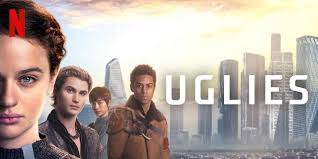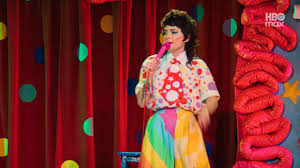Uglies 2024 Movie Review
Back in 2012, when this writer was 15, every few months my friends and I would run to the theater for the cinematic event of the most recent adaptation of a bestselling YA novel. Whether it was a love triangle amidst dystopian warfare in The Hunger Games or another title in the “terminally ill teenagers fall in love” subgenre, there really was no time like that era when John Green wielded as much power as Kevin Feige does today. These releases were once box-office gold, but lost steam and ultimately had no place in the MCU and streaming climate of cinema and television today — and the final movie in the Divergent series is the carcass of evidence. To compare, 2014’s The Fault in Our Stars earned over $300 million at the global box office, whereas 2019’s Five Feet Apart took in less than a third of that.
So, you’d understandably be confused that almost a decade after the end of the Golden Age of YA adaptations, Netflix decided to adapt one of the prime novels of this period — Scott Westerfield’s Uglies, which was published in 2005 and spawned three sequels. While 20th Century Fox quickly snapped up the film rights a year after the book came out, it has taken almost 20 years for the movie to make it to our screens. And boy, does this movie show how much can change in 20 years. What was once considered revolutionary or sharp commentary is now so passé and outdated that it makes the film feel like an ancient relic — a bad one.
Some hundred years into the future, humans’ overreliance on fossil fuels has led to global collapse. While a sustainable and renewable source of fuel has been developed, the nastiness of human nature has ensured that we still fuck things up. So, to get to the root of the problem, humans need to be changed. Every human, on their 16th birthday, undergoes a cosmetic surgery that makes them transform from “Ugly” to “Pretty.” Once you are Pretty, you live the most lavish and perfect life, looking as “beautiful” as the person next to you (i.e. everyone looks like they have the same yassified Snapchat filter on their face). Why are humans’ looks being enhanced when the procedure is meant to stop people from being greedy assholes who create class divides and ruin the planet? Your guess is as good as mine.
Tally Youngblood (the on-the-nose surname screams 2005), can’t wait to turn 16 in just two months. She lives in the dorms with her fellow Uglies, as they are schooled to believe in this system of society led by Dr. Cable (Laverne Cox, who’s too good for this). Tally and her best friend Peris (Chase Stokes) peer into the life of the yassified Pretties as they live out their lives at fabulous parties without a care in the world. (At this point, TikTok Mormon husband Lucky Blue Smith makes a cameo, which is never an indicator of fine cinema.) Peris is set to get his procedure the next day, but they promise to still stay true to themselves and remain friends, even while Peris is a Pretty and Tally is still “Ugly.” However, as soon as he becomes Pretty, Peris has no interest in fraternizing with those who don’t look exactly like him.
Heartbroken at the end of her closest friendship (and of course, unspoken love), Tally strikes up a friendship with Shay (Brianne Tju), who doesn’t gawk at the CGI picture of what she’ll look like once she’s Pretty. She’s different — she shows Tally how to hoverboard, and questions everything that she has been indoctrinated to believe. When Shay reveals to Tally that she wants to find the legendary David (Keith Powers) and live in the Smoke (the land of the anarchists who reject the ways of the City and the procedure), Tally is too scared to join her. But when Dr. Cable enlists her help to infiltrate the Smoke and find the alleged weapon they are working on to destroy the city, Tally must choose between a life laid out for her or something even bigger.
It’s so clear from the outset of the film that it wants us to be in awe of its worldbuilding. A ring on Tally’s finger shoots up a hologram screen alerting her to a new message. She can play around with her desired prospective face like she’s creating Sims. We’re expected to marvel at the capabilities of this world, from bungee jackets to hoverboards to cupcakes being created out of thin air. Maybe this was revolutionary technology back in 2005 (even though we were still 30 years after hoverboards in Back to the Future), but in 2024, we’ve seen this all before, and so much better. The clam e-reader in It Follows alone evokes more jealousy than anything in Uglies.
Tally’s life in the city is a cross between the rejected concept art for the original Blade Runner and Vegas in the 1950s (that might even be too complimentary). The heavy-CGI world doesn’t let director McG have any fun with his set pieces. Lest we forget, he gave us two of the greatest and simplest action flicks of all time in 2000’s Charlie’s Angels and its sequel. But there’s no room for us to be awed at a character defying the laws of gravity and flying through the air when these laws don’t apply to a made-up world. McG’s campy sensibilities get lost in this dull, bleak, and heavily digitized world that moreso resembles the early 2000s Tony Hawk video games than a 2024 feature. There are several sequences of Tally and Shay flying through the air and, again, we’re supposed to marvel at these cinematic accomplishments when they feel outdated in today’s cinematic climate. The overreliance on CGI makes this world too fake-looking to invest in or buy into.
The main question you might have while watching this film (especially if you, like me, haven’t read the book) is what is this all supposed to represent? You would think, going off the very basics like the title, it has to do with beauty standards. If that’s the case, Uglies really has absolutely nothing to say on the matter. It’s also extremely difficult to take any of the representation of this story seriously when you have gorgeous, young Hollywood stars calling themselves “Uglies.” You can’t help but feel your eyes go to the ceiling when Netflix’s Golden Boy Chase Stokes, star of the other sexy-ensemble Netflix joint Outer Banks, talks about how he can’t wait to finally be good-looking.
All the “Pretties,” after their procedure, look like an Instagram filter malfunctioned while scanning their face. A later reveal of a Pretty is so hideously shocking, it looks like the AI ads of horny singles near you when you try to watch illegal movies online. The film very well could be mocking the ridiculous standards set by the precedent of cosmetic surgery and technology’s offering of altering our looks in pictures, but it appears more as though Netflix made major cutbacks on the special effects department. With this movie coming out at the same time as The Substance and the year after Barbie, Uglies brings nothing of worth to its conversation about beauty standards. It’s a hollow mediation on society’s division between those who adhere to beauty standards and those who wish to be rid of them. Also, this film being released in a post-COVID world could have some people perceive it as an anti-vax analogy. A group of off-the-grid “freethinkers” who reject government-mandated medicine that they believe makes people into mindless drones may not spell “Be yourself!!” in today’s climate as it did in 2005.
It’s hard to watch this and see Joey King as anything other than her Kissing Booth performance but with hoverboards. Like in that (admittedly, much more enjoyable) movie, King’s Tally is an uncompelling pick-me girl that pales in comparison to other dystopian heroines (like Katniss Everdeen, which the film is most certainly trying to turn her into). There is no chemistry between her and Powers, and you end up rooting for the villain mostly because Laverne Cox is having more fun than anyone else. A standout of the younger performers is Brianne Tju as Shay, the only character who has any believable vulnerability and injects every scene with the childlike wonder the film is so obviously lacking.
If Uglies had been adapted back in the Golden Age of YA and was given the right budget at a time when the original readers of the book were still teens, it might have had a chance. But waiting nearly 20 years, not updating any of the material, and giving it probably a fraction of what dystopian, futuristic films ought to get made this an immediate recipe for failure. For young teens hoping to find a new YA series to fall in love with, The Hunger Games is right there, along with probably most teen-led movies that came out in the 2010s. Any of them are better than this.




